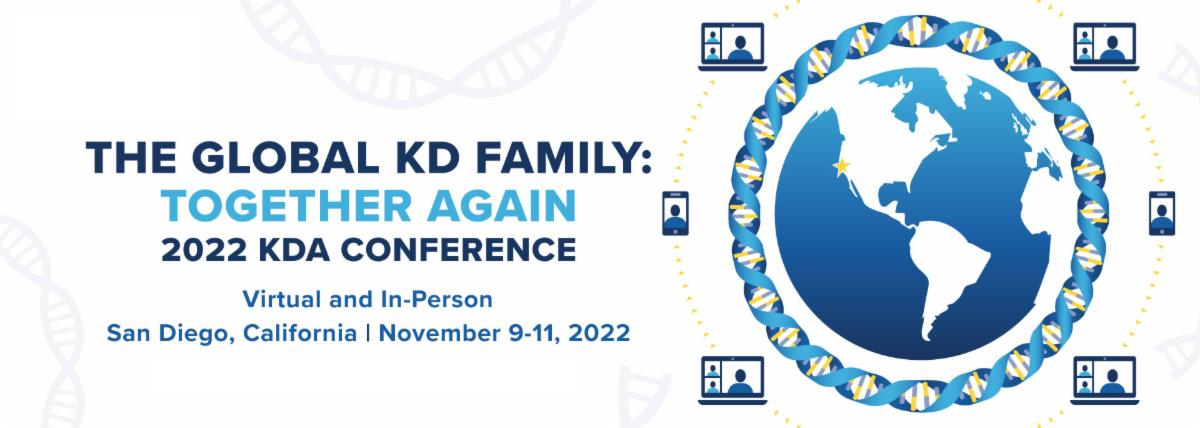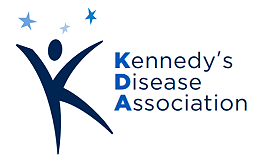2022 PFDD
Learning through Listening
Where and When
A Patient-Focused Drug Development (PFDD) meeting will be held on the first day of the 2022 KDA conference, Wednesday, November 9.

What is Kennedy's Disease?
Kennedy's Disease (KD), also known as Spinal and Bulbar Muscular Atrophy or SBMA, is a rare, hereditary, adult-onset, neuromuscular disease caused by a repeat expansion of the trinucleotide cytosine-adenine-guanine (CAG) in the androgen receptor (AR) gene. The resulting mutation affects motor neurons and muscles, leading to a slow decline of muscle function. KD is an X-linked disease that affects primarily men; women are carriers and may experience symptoms such as cramping. There is no cure and no effective treatment.
Symptoms generally appear in the mid-40s, although earlier and later onsets have been recorded. Cramping, fasciculations, and a continuing decline in mobility are common. Bulbar manifestations include difficulties with speech and swallowing that may increase over time. Laryngospasms cause a frightening sense of choking, and tongue muscles tend to atrophy over the course of the disease. Endocrine-related abnormalities such as gynecomastia, fatty liver, diabetes, and reduced fertility usually accompany the neuromuscular symptoms.
Global prevalence estimates for KD range from 1:50,000 to 1:30,000 individuals, with higher incidences in some areas of Italy, Japan, and Finland due to multiple founder effects. The actual prevalence may be higher due to cases that are either undiagnosed or misdiagnosed. The most frequent misdiagnosis is the fatal Lou Gehrig's Disease (ALS). Kennedy's disease patients can typically expect a normal lifespan unless KD leads to a catastrophic accident due to a bad fall or to aspiration pneumonia.
What is a PFDD?
The goal of this Patient-Focused Drug Development (PFDD) meeting is to provide the U.S. Food and Drug Administration (FDA), medical product developers, clinicians, and academic researchers an opportunity to hear perspectives from individuals with Kennedy's Disease on the health effects and daily impacts of their Kennedy's Disease, treatment goals, and decision factors considered when seeking out or selecting a treatment. This meeting is being conducted as a parallel effort to FDA's PFDD Program to more systematically gather patients' perspectives on their conditions and available therapies to treat their conditions.
For sample questions to be addressed at the KDAPFDD, visit the Sample Questions page.
Frequently Asked Questions
Is the FDA sponsoring this meeting?
FDA has authorized KDA to conduct an “Externally Led Patient Focused Drug Development” (EL-PFDD) meeting. This means that, while FDA will participate in the meeting as observers and may ask questions during the discussion, KDA will actually lead the meeting. For more information about the FDA process, please visit their website, CDER Patient-Focused Drug Development | FDA.
Why does the FDA conduct PFDD meetings?
The FDA's view is that “People living with a condition are uniquely positioned to inform the understanding of the therapeutic context for drug development and evaluation.” The lived experiences of patients with a disease provide a unique and valuable window into the most troublesome symptoms of a disease and the effectiveness of current treatments. Direct input from patients helps the FDA evaluate treatments proposed by pharmaceutical companies. PFDD meetings have been conducted since 2012. For more information about previous PFDDs, visit the website, FDA-led Patient-Focused Drug Development (PFDD) Public Meetings | FDA.
Why is a PFDD important for Kennedy's Disease (KD)?
Will clinical trials for a KD treatment be starting soon?
Why are we doing the PFDD as part of KDA's annual conference?
Will the results of the PFDD be made available to the general public?
Do you need to register for the KDA conference to participate in the PFDD?
No, anyone can participate in the PFDD session which will be live-streamed on Zoom. You can register for the PFDD here. Be sure to include your email to ensure you receive the link for the meeting.
How will my information be used?
